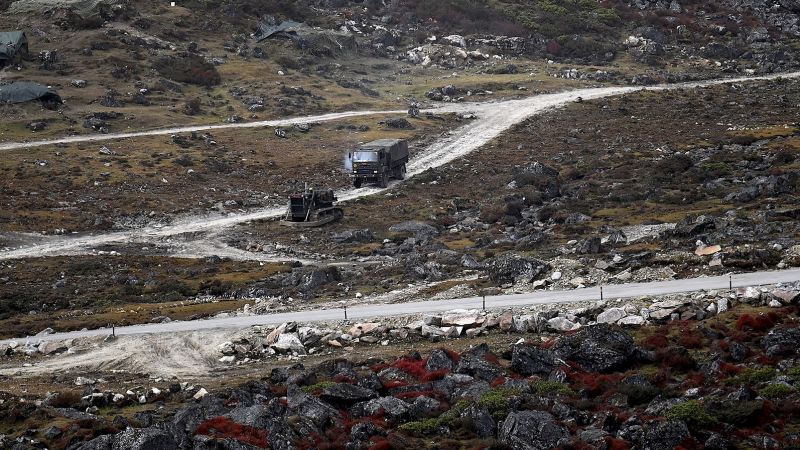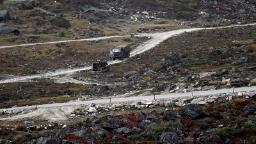

New Delhi
CNN
—
Indian and Chinese troops have clashed on their disputed Himalayan border, the first known incident between the two nuclear-armed Asian powers in nearly two years.
In a statement, India’s Ministry of Defense said soldiers from both sides sustained minor injuries in the face-off, which took place Friday in the Tawang Sector in India’s northeastern territory of Arunachal Pradesh, a remote, inhospitable region that borders southern China.
The 2,100 mile-long (3,379-kilometer) disputed border has long been the source of friction between New Delhi and Beijing, with tensions escalating sharply in June 2020 when hand-to-hand fighting between the two sides resulted in the deaths of at least 20 Indian and four Chinese soldiers in Aksai Chin-Ladakh.
Speaking to lawmakers Tuesday, India’s Defense Minister Rajnath Singh accused China’s People’s Liberation Army (PLA) troops of trying to “unilaterally” change the status quo by attempting to cross the line of actual control (LAC) – the two countries’ de facto border.
“The ensuing faceoff led to a physical scuffle in which the Indian Army bravely prevented the PLA from transgressing into our territory and compelled them to return to their posts,” Singh said, adding there were no serious injuries on the Indian side.
In its earlier statement, the Indian Defense Ministry said both sides “immediately disengaged from the area” and the countries’ respective commanders there held a flag meeting to discuss the issue in “accordance with structured mechanisms to restore peace and tranquility.”
Singh said that meeting occurred Sunday and the Chinese side was “asked to refrain from such actions and maintain peace and tranquility” along the border. The issue was also being addressed through diplomatic channels, he added.
China’s Foreign Ministry did not directly acknowledge the incident in a regularly scheduled news briefing on Tuesday.
“As far as we know, the China-India border area is generally stable, and both sides have maintained smooth communications on boundary-related issues through diplomatic and military channels,” spokesman Wang Wenbin said when asked about India’s statement on the incident, pointing reporters to “competent authorities” for “specifics.”
China hoped India would be “on the same page” to “jointly preserve the peace and stability of the China-India border,” he added.
India and China went to war over their border regions in 1962, eventually establishing the LAC. But the two countries do not agree on its precise location and both regularly accuse the other of overstepping it, or seeking to expand their territory. There have been a series of mostly non-lethal scuffles over the position of the border in the years since, including the previously most recent known example in 2021, according to a statement from the Indian Army at the time.
In September, the Indian government said that Indian and Chinese troops had begun disengaging from the Gogra-Hotsprings border area in the western Himalayas, two years after clashes at the frontier strained diplomatic ties.
That statement came ahead of a regional summit in Uzbekistan attended by both Indian Prime Minister Narendra Modi and Chinese leader Xi Jinping.
Activities in the region remain closely watched on both sides.
On November 30, China’s Foreign Ministry criticized high altitude joint exercises conducted between US and Indian troops in northern India’s Uttarakhand, saying that the exercises did “not help build bilateral trust” and that Beijing had expressed concerns to New Delhi.
China has grown wary of India’s ties with the United States in recent years, as China-US relations have cratered and the Quad security dialogue, which includes India, the US, and American allies Japan and Australia has become more active.
Modi and Chinese leader Xi last met at the Group of 20 (G20) summit in Bali last month, where the two shook hands but did not have a bilateral sit-down.
Speaking to Parliament last week prior to the skirmish, Indian Foreign Minister Subrahmanyam Jaishankar said there had been “abnormality” in China-India relations in recent years due to border concerns, and that New Delhi “diplomatically” had been “very clear” with China that they “will not tolerate attempts to unilaterally change” the LAC.
“So long as they continue to seek to do that, and if they have built up forces, which in our minds constitute a serious concern in the border areas, then our relationship is not normal,” Jaishankar said, in response to a question on Sino-Indian relations, adding that the military commanders “continue to engage each other.”
